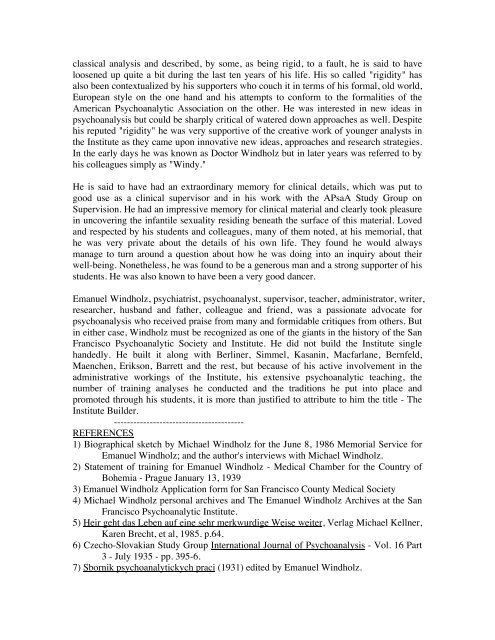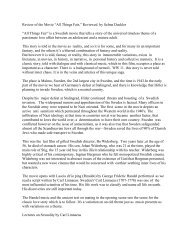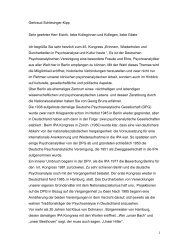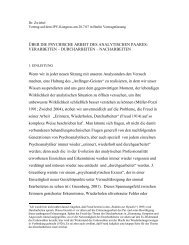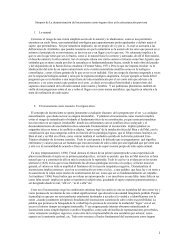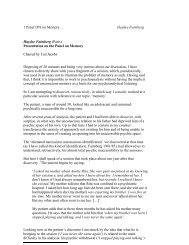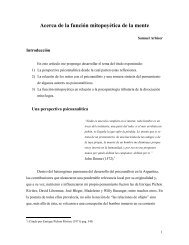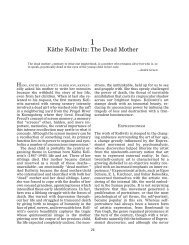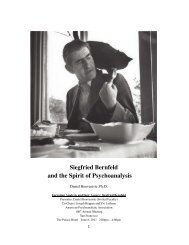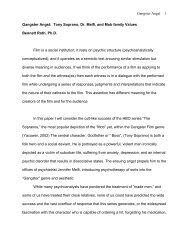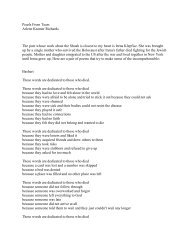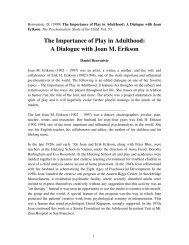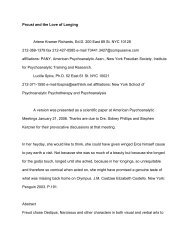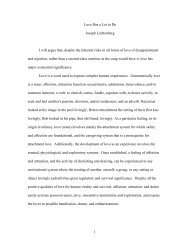Emanuel Windholz: The Institute Builder - International Psychoanalysis
Emanuel Windholz: The Institute Builder - International Psychoanalysis
Emanuel Windholz: The Institute Builder - International Psychoanalysis
You also want an ePaper? Increase the reach of your titles
YUMPU automatically turns print PDFs into web optimized ePapers that Google loves.
classical analysis and described, by some, as being rigid, to a fault, he is said to have<br />
loosened up quite a bit during the last ten years of his life. His so called "rigidity" has<br />
also been contextualized by his supporters who couch it in terms of his formal, old world,<br />
European style on the one hand and his attempts to conform to the formalities of the<br />
American Psychoanalytic Association on the other. He was interested in new ideas in<br />
psychoanalysis but could be sharply critical of watered down approaches as well. Despite<br />
his reputed "rigidity" he was very supportive of the creative work of younger analysts in<br />
the <strong>Institute</strong> as they came upon innovative new ideas, approaches and research strategies.<br />
In the early days he was known as Doctor <strong>Windholz</strong> but in later years was referred to by<br />
his colleagues simply as "Windy."<br />
He is said to have had an extraordinary memory for clinical details, which was put to<br />
good use as a clinical supervisor and in his work with the APsaA Study Group on<br />
Supervision. He had an impressive memory for clinical material and clearly took pleasure<br />
in uncovering the infantile sexuality residing beneath the surface of this material. Loved<br />
and respected by his students and colleagues, many of them noted, at his memorial, that<br />
he was very private about the details of his own life. <strong>The</strong>y found he would always<br />
manage to turn around a question about how he was doing into an inquiry about their<br />
well-being. Nonetheless, he was found to be a generous man and a strong supporter of his<br />
students. He was also known to have been a very good dancer.<br />
<strong>Emanuel</strong> <strong>Windholz</strong>, psychiatrist, psychoanalyst, supervisor, teacher, administrator, writer,<br />
researcher, husband and father, colleague and friend, was a passionate advocate for<br />
psychoanalysis who received praise from many and formidable critiques from others. But<br />
in either case, <strong>Windholz</strong> must be recognized as one of the giants in the history of the San<br />
Francisco Psychoanalytic Society and <strong>Institute</strong>. He did not build the <strong>Institute</strong> single<br />
handedly. He built it along with Berliner, Simmel, Kasanin, Macfarlane, Bernfeld,<br />
Maenchen, Erikson, Barrett and the rest, but because of his active involvement in the<br />
administrative workings of the <strong>Institute</strong>, his extensive psychoanalytic teaching, the<br />
number of training analyses he conducted and the traditions he put into place and<br />
promoted through his students, it is more than justified to attribute to him the title - <strong>The</strong><br />
<strong>Institute</strong> <strong>Builder</strong>.<br />
----------------------------------------<br />
REFERENCES<br />
1) Biographical sketch by Michael <strong>Windholz</strong> for the June 8, 1986 Memorial Service for<br />
<strong>Emanuel</strong> <strong>Windholz</strong>; and the author's interviews with Michael <strong>Windholz</strong>.<br />
2) Statement of training for <strong>Emanuel</strong> <strong>Windholz</strong> - Medical Chamber for the Country of<br />
Bohemia - Prague January 13, 1939<br />
3) <strong>Emanuel</strong> <strong>Windholz</strong> Application form for San Francisco County Medical Society<br />
4) Michael <strong>Windholz</strong> personal archives and <strong>The</strong> <strong>Emanuel</strong> <strong>Windholz</strong> Archives at the San<br />
Francisco Psychoanalytic <strong>Institute</strong>.<br />
5) Heir geht das Leben auf eine sehr merkwurdige Weise weiter, Verlag Michael Kellner,<br />
Karen Brecht, et al, 1985. p.64.<br />
6) Czecho-Slovakian Study Group <strong>International</strong> Journal of <strong>Psychoanalysis</strong> - Vol. 16 Part<br />
3 - July 1935 - pp. 395-6.<br />
7) Sbornik psychoanalytickych praci (1931) edited by <strong>Emanuel</strong> <strong>Windholz</strong>.


